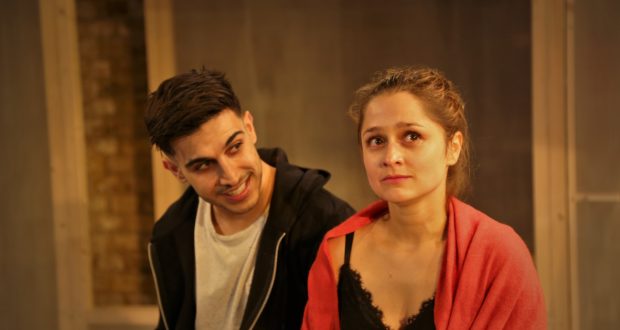Pros: Wonderful movement sequences in one of London’s best theatres.
Cons: Everything we see happens on one emotional dimension, with so much psychology left unexplored. An alluring premise involving mental health, art and terrorism, but one that is never fully explored.
Summary
Rating
Good
I’ve said this before, I’ll say it again: I love going to the Arcola Theatre. It is diverse, unpretentious and as its multiple Offie awards prove it really is the most welcoming theatre in East London, if not the whole of London. Moormaid is equally diverse, but not unpretentious and I didn’t love it.
Big, bold statements lured me into some pretty high expectations. Billed as “an explosive new play about self-destruction and rebirth”, it promised to take us on a journey amalgamating art teacher Melissa’s mental health struggle with the universal fear and paranoia surrounding terrorism. Writer Marion Bott offers a microscopic view over both elements, closely inspecting their humanity.
In truth, I didn’t find the humanity in either. Nor did I find any real amalgamation. Both are huge, obtuse subject matters to tackle. Both are also incredibly delicate, demanding intricacy, accuracy and empathy in how they are handled – both through research and theatricality.
The play opens, extremely boldly, with Melissa attempting self-asphyxiation. This, in itself, appears superficial, there is no emotion. It is broken by colloquial phone calls to her husband who, as far as we know, counts for fifty percent of her suicide attempt – she doesn’t love him. The other fifty percent is attributed to her diminished ability to create, the joy of art having been sucked out of her by teaching it. This is referenced fleetingly, and there is no further discussion or active reference to her mental health.
Mehdi (played by Moe Bar-el Mehdi) an ex-student and ex-love interest of Melissa’s arrives two years late for dinner, seeking somewhere to hide. Suddenly, as if by magic, Melissa’s attention is diverted from suicide to him; to lust, to intrigue, and to all that is encompassed within this man.
We learn Mehdi’s intent on terror, very theatrically, through the ghost of his friend Khan – a fellow terrorist whom Mehdi left behind. Played by Ali Azhar, he is by far the most accomplished performer of the piece. During each visit that Khan pays we learn a tiny bit more about their planned attack and past actions. But we never learn enough.
Most integrally, we never learn why; we are never given any insight into the mindset of these characters. Much like Melissa, her mental health and her ability to just continue; what we have and know of these characters is very surface level. We do not encounter any psychological insight and it just isn’t enough to sustain eighty minutes.
In the same vein, Zois Pigadas’ direction is a little one dimensional. The Arcola’s studio 2 is in thrust; I was sat on one side and had to watch the lion’s share of the action in profile. I’m told there were some interesting silhouettes and comedic moments involving Khan’s ghost behind white screens upstage, but I wouldn’t know because I couldn’t see it.
Jess Tucker-Boyd’s movement direction, however, brought an extra dimension to the piece, a fluidity and an artistry that reflected the artistic references throughout. The actors moved, in unison, representing painting and then sex with repeated movements that sent me dizzy in the telling of a story of their own. My only complaint about the movement segments is that there wasn’t more of them.
I guess, that is my lasting impression of Moormaid: I wanted more. A deeper insight, more levels, more story. The premise is enticing but I didn’t get much more after that.
Author: Marion Bott
Director: Zois Pigadas
Producer: The Alchemist Theatre Company and Fine Line Production
Booking Until: 19 May 2018
Box Office: 020 7503 1646
Booking Link: https://www.arcolatheatre.com/event/moormaid-2018-04-24/
 Everything Theatre Reviews, interviews and news for theatre lovers, London and beyond
Everything Theatre Reviews, interviews and news for theatre lovers, London and beyond



